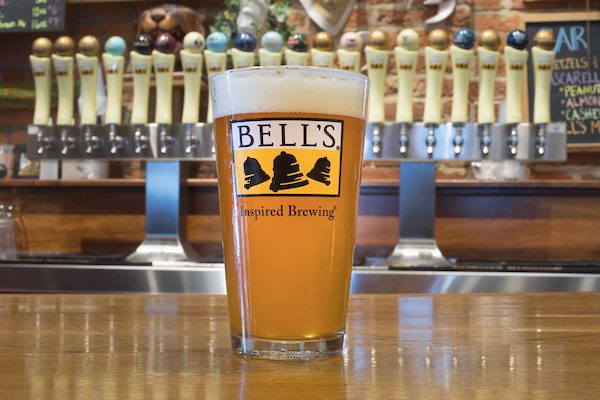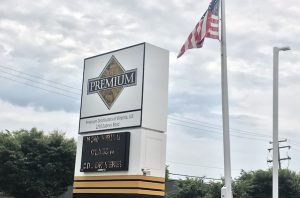
Bell’s beer has since halted all of its beer from being sent to Virginia as a result of the dispute. (Courtesy of Bell’s)
A Michigan brewery and a Virginia beer distributor are heading to the arbitration table in their dispute stemming from a local acquisition.
This month, the Virginia ABC Authority ruled that Bell’s Brewery and Premium Distributors of Virginia must head to arbitration to settle their dispute that has taken Bell’s beer out of taplines and off shelves all over the state – a move that followed Premium’s purchase late last year of Richmond-based Loveland Distributing Co.
Per the ABC’s order, which was issued May 7 with procedural details released a week later, Bell’s and Premium are to select an arbitrator, initiate the process by May 28 and submit the arbitrated decision by Aug. 2.
The dispute began last October when Premium, a subsidiary of distribution giant Reyes Beer Division, entered into an agreement to purchase Loveland, which had been distributing Bell’s locally for three years.

Premium Distributors of Virginia’s Richmond location at 2290 Dabney Road, formerly Loveland Distributing Co.’s headquarters. Photo by Mike Platania.
As part of the sale, Loveland asked Bell’s to approve the transfer of Loveland’s distribution rights to Premium.
Bell’s – a privately owned craft brewery based in Kalamazoo, MI, which supplies beer in 40 states, including its popular Two Hearted Ale and Oberon Ale – requested all schedules and information about Loveland’s pending sale, but claims that Loveland denied its requests.
Loveland later argued that Bell’s then “unreasonably cancelled two of its orders and failed to fill Premium’s order for an account Premium ‘automatically inherited’ upon the closing of the asset sale,” and that Bell’s stopped supplying product for distribution in Virginia.
“At that point, the record suggests the parties became intransigent,” the ABC wrote in its decision.
In December, Bell’s, through its attorney Thomas Lisk of law firm Cozen O’Connor, wrote to Loveland President Mark Stepanian, saying that “Bell’s is compelled to issue this written notice of intent to terminate the distributor agreement.”
Lisk’s letter, dated Dec. 4, notes that the sale between Premium and Loveland was scheduled to close Dec. 7.
Bell’s and Loveland then argued their positions to the ABC at a March 1 hearing. The month before, Bell’s had stopped supplying to all of Virginia as a result of the dispute.
The ABC states in its May 7 ruling that Loveland’s position is “misguided” and Bell’s position is “untenable” before concluding that it will compel arbitration.
In a phone interview last week, Bell’s founder and President Larry Bell said he’s pleased with the decision to send the matter to arbitration.
“It puts us on a more even playing field as far as the venue is concerned. It gives us more standing than we would have had with the ABC,” Bell said.
It happened before, too.
Bell, who in 2006 faced a similar situation with Reyes in Illinois, said the brewery’s complaint was simple: It wanted Loveland to share the information about the sale of Bell’s distribution rights.
“They were not sharing that, therefore (the contract is) terminated because the contract says you have to share that information,” Bell said. “We think that was a reasonable ask, the purchasing wholesaler thinks that’s an unreasonable ask. And now we go to arbitration to decide what’s reasonable.”
Bell said he was told by counsel to expect about a six-month process to resolve the dispute, unless the parties find another way to settle it.
“Our greatest hope is that a business solution could be found to the existing problem and try to avoid any legal proceedings. We haven’t been successful at that so far, but that would still be our choice,” Bell said.
Reyes and Premium did not respond to requests for comment. Premium is represented by Marston & McNally attorneys Walter Marston and Kevin McNally. Lisk is representing Bell’s with Cozen O’Connor colleague Chad Kurtz.

Bell’s beer has since halted all of its beer from being sent to Virginia as a result of the dispute. (Courtesy of Bell’s)
A Michigan brewery and a Virginia beer distributor are heading to the arbitration table in their dispute stemming from a local acquisition.
This month, the Virginia ABC Authority ruled that Bell’s Brewery and Premium Distributors of Virginia must head to arbitration to settle their dispute that has taken Bell’s beer out of taplines and off shelves all over the state – a move that followed Premium’s purchase late last year of Richmond-based Loveland Distributing Co.
Per the ABC’s order, which was issued May 7 with procedural details released a week later, Bell’s and Premium are to select an arbitrator, initiate the process by May 28 and submit the arbitrated decision by Aug. 2.
The dispute began last October when Premium, a subsidiary of distribution giant Reyes Beer Division, entered into an agreement to purchase Loveland, which had been distributing Bell’s locally for three years.

Premium Distributors of Virginia’s Richmond location at 2290 Dabney Road, formerly Loveland Distributing Co.’s headquarters. Photo by Mike Platania.
As part of the sale, Loveland asked Bell’s to approve the transfer of Loveland’s distribution rights to Premium.
Bell’s – a privately owned craft brewery based in Kalamazoo, MI, which supplies beer in 40 states, including its popular Two Hearted Ale and Oberon Ale – requested all schedules and information about Loveland’s pending sale, but claims that Loveland denied its requests.
Loveland later argued that Bell’s then “unreasonably cancelled two of its orders and failed to fill Premium’s order for an account Premium ‘automatically inherited’ upon the closing of the asset sale,” and that Bell’s stopped supplying product for distribution in Virginia.
“At that point, the record suggests the parties became intransigent,” the ABC wrote in its decision.
In December, Bell’s, through its attorney Thomas Lisk of law firm Cozen O’Connor, wrote to Loveland President Mark Stepanian, saying that “Bell’s is compelled to issue this written notice of intent to terminate the distributor agreement.”
Lisk’s letter, dated Dec. 4, notes that the sale between Premium and Loveland was scheduled to close Dec. 7.
Bell’s and Loveland then argued their positions to the ABC at a March 1 hearing. The month before, Bell’s had stopped supplying to all of Virginia as a result of the dispute.
The ABC states in its May 7 ruling that Loveland’s position is “misguided” and Bell’s position is “untenable” before concluding that it will compel arbitration.
In a phone interview last week, Bell’s founder and President Larry Bell said he’s pleased with the decision to send the matter to arbitration.
“It puts us on a more even playing field as far as the venue is concerned. It gives us more standing than we would have had with the ABC,” Bell said.
It happened before, too.
Bell, who in 2006 faced a similar situation with Reyes in Illinois, said the brewery’s complaint was simple: It wanted Loveland to share the information about the sale of Bell’s distribution rights.
“They were not sharing that, therefore (the contract is) terminated because the contract says you have to share that information,” Bell said. “We think that was a reasonable ask, the purchasing wholesaler thinks that’s an unreasonable ask. And now we go to arbitration to decide what’s reasonable.”
Bell said he was told by counsel to expect about a six-month process to resolve the dispute, unless the parties find another way to settle it.
“Our greatest hope is that a business solution could be found to the existing problem and try to avoid any legal proceedings. We haven’t been successful at that so far, but that would still be our choice,” Bell said.
Reyes and Premium did not respond to requests for comment. Premium is represented by Marston & McNally attorneys Walter Marston and Kevin McNally. Lisk is representing Bell’s with Cozen O’Connor colleague Chad Kurtz.



